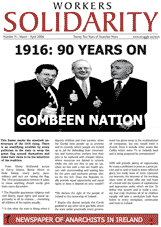Over 30 years of anarchist writing from Ireland listed under hundreds of topics
Changes in Bolivia: The victory of Evo Morales
The victory of Evo Morales in the presidential elections in Bolivia in December has underlined once more that across Latin America there is a demand for change. The first significant victory came back in 2002 when Lula, the leader of the Brazilian Workers Party was elected to power after a long and arduous campaign that stretched back almost two decade. It is claimed that Lulu’s victory and his pronouncements about making Brazil a fairer society sent ‘shivers’ through world stock markets.
Although different in origins and style, Hugo Chavez in Venezuela has had a similar impact on the world stage – praised by those seeking radical change; attacked by those connected with business and financial institutions. Chavez is former army officer and was first elected to power in 1998. Despite repeated efforts at destabilising his regime, including one almost successful coup attempt, he has remained in power. He is widely hailed among Venezuela’s poor and in 2004 survived a rightwing inspired referendum aimed at driving him from office.
Evo Morales is of a similar ilk. His Movement To Socialism is an alliance of indigenous activists and peoples’ movements whose declared aims are for the nationalisation of the natural resources of Bolivia and the setting up of a proper representative parliament. Although neither of these demands might appear to be radical, in terms of Bolivian society and history they are. Just over 100 identifiable families control the most of wealth and resources of Bolivia, which remains the poorest society in South America.
DISASTEROUS
The rise to power of Morales, Chavez and Lula (among others) has come at the end of a long and sustained period of conservative rule in the Latin American region. Brutal dictatorship, fixed elections and repression have been repeatedly used to stem any popular pressure for change. However since the early 90s and following the collapse of the Soviet Union, there has been a gradual and slow return to normality. Although open and fairer elections have been back in favour, all they have resulted in is the imposition of neo-liberal policies in the region. The disastrous impact of these policies – privatisations, cutbacks, and subsidies of the wealthy - together with the overwhelming and persistant sense that nothing has really changed in the region is feeding this new upsurge in electorate support for what are perceived to be ‘radical’ left leaders.
The recent victories then, in this sense, are important in terms of what they represent. Popular movement are recovering their confidence and the election successes reflect the fact that people want and demand change. But the biggest question of all remains – what can be achieved through electoral successes?
Bolivia is one case in point. Although Morales’ victory has been widely hailed and celebrated, it is recognised and feared by many of his supporters that he won’t ‘dare’ to push forward towards the nationalisation of Bolivia’s wealth. Leave aside for a moment the question of whether nationalisation would be of any use to the workers of Bolivia. The problem that Morales faces it that to suggest nationalisation would be to ‘provoke’ the wealthy elite who will not tolerate handing over any of their money. Ditto with the demand for a legitimate parliament. So in a sense then Moralez may well have been elected ‘to power’ but he has in fact very little ‘power’. He holds office on condition – and this condition is that he will not implement what he really stands for. As anarchists have repeatedly pointed out, it is one of pitfalls off electoral success. For radicals to stay in power they must renege on their programme.
TAKING ADVICE
A different and worse example of the pitfalls of electoral politics comes from the situation in Brazil. Since Lulu came to power in 2002 the process of compromising to stay in power has accelerated at a rapid pace. Last year Lula’s Workers Party was implicated in a process of widespread corruption – paying parliament members for theirs votes to seal majorities in votes. Secret and underhand deals are rife with Lula himself ‘taking the advice’ of a number of economic advisors and abandoning the platform on which he was elected. Last year he implemented a series of neo-liberal polices that specifically hurt the poor. His radical sheen is well gone.
Although ‘the electoral road’ is touted as a means for bring about change, it has disappointed repeatedly. More to the point it needs to be borne in mind that the electoral movement is not as such the movement. Rather they have capitalised on what is already happening across the region. Important grassroots movements have emerged which while diffuse in structures nevertheless are clear in their demands – change will have to come. As one Moralez supporter put it. “If Evo doesn’t deliver, we will rebel again.’ In Bolivia as elsewhere it is these grassroots movement that hold the long-term key to the creation of a revolutionary movement.
From Workers Solidarity 91, March/April 2006
PDF file online at http://www.wsm.ie/sites/default/files/ws91.pdf


